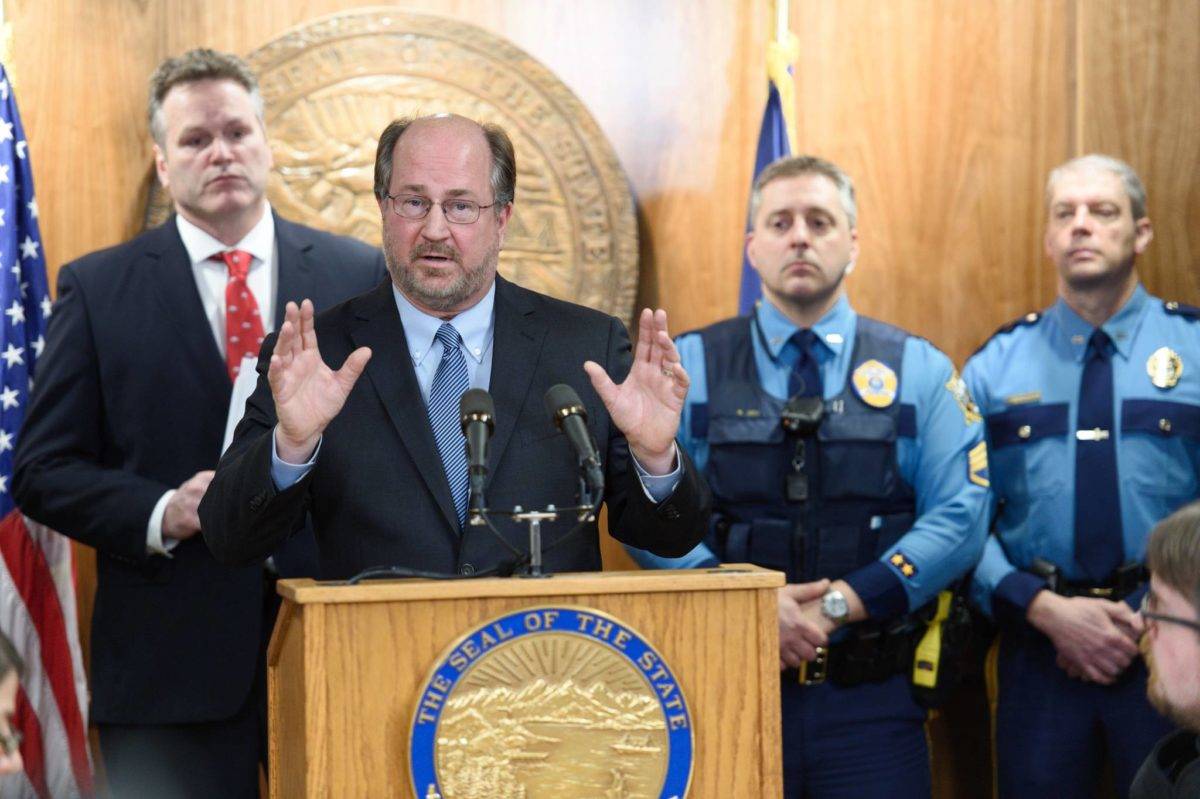After promising to crack down on crime in his State of the State address, Gov. Mike Dunleavy on Wednesday unveiled four bills that he hopes will reduce crime in Alaska.
The bills will address sex crimes, pretrial processes, parole and prison sentences.
“The No. 1 priority of this administration is public safety. And it’s really the No. 1 priority for all Alaskans,” Dunleavy said during a press conference. “It is the No. 1 job for any governor in any state to make sure the people of their state is safe.”
Alaska has seen a dramatic increase in crime during the last five years. According to the Department of Public Safety’s uniform crime report, which Dunleavy cited, the overall crime rate has increased 26 percent during the last five years. Violent crime is up 35 percent and property crime is up 23 percent during the same time period.
Dunleavy said the four bills are just the beginning of the total package of crime bills he intends to bring forward. He said these bills should “plug” some of the holes that Senate Bill 91 left in Alaska’s criminal justice system. SB 91 is a controversial criminal justice reform bill passed into law two years ago, aimed at reducing recidivism. It has been criticized for being too lenient on criminals.
Dunleavy said he will continue to address other aspects of public safety – such as drug treatment — through other bills.
Specifics of how much Dunleavy’s package of crime bills will cost in the end are unclear, since he is still working on his budget. The govenor’s budget is due for Feb. 13.
[Gov’s crime message resonates, but Juneau lawmakers hesitant about constitutional amendments]
The budget will have to address the costs associated with public safety reform. For example: Senate Bill 32 would increase the penalty for felons who violate the terms and conditions of their release or parole. The Department of Corrections estimated this would result in 97 more inmates in jail, each day in the next fiscal year, according to a fiscal note. If it costs $168.74 to house an immate in a corrections facility a day, that would amount to $5,711,071 for one year.
Dunleavy on Wednesday doubled down on jailing people in an effort to make Alaska safe.
“When people ask the question ‘Are these folks going to go to jail?’ Yes they’re going to jail. Will we need to increase the number of beds in jail? Probably, yes.” Dunleavy said. “Will we need to increase jails? Maybe, we’ll see. We’re not going to spare the resources that are necessary to turn this around. I’m serious about this. This is not just campaign rhetoric.”
Senate Bill 32
Certain crimes would carry a heavier sentence if this bill passes. That includes every crime that had its sentence reduced when SB 91 was passed.
A memo from Dunleavy states that people who sell and traffic drugs would “have significant incarceration periods.”
Removing or disabling an ankle monitor would be a felony, and that would go for people in the pre-trial phase or post-conviction.
Senate Bill 33
This bill focuses on pre-trial processes. First, it would allow judges to determine a person’s pre-trial status: whether a person is released, uses an ankle bracelet, given to a third-party custodian, or if the person will be taken care of by the Department of Corrections.
It would also require two-way video conferencing for all pre-trial hearings.
Senate Bill 34
This bill aims to improve the parole system. Proposed changes include:
• Incentivizes good behavior of parolees through giving them compliance credits toward an early end to their probation.
• It incentivizes good behavior from parolees by eliminating the cap on the time added for violating their probation.
• It would restrict which inmates are eligible for parole. For example, inmates with prior felonies, sex and offenders would be restricted.
Senate Bill 35
This would update the criminal code in an effort to crack down on sexual assault or other crimes of a sexual nature. SB 35 would include the following changes:
• It would classifying unwanted contact with semen as sexual contact and make it punishable as a sex offense.
• A person commits the crime of harassment if they repeatedly send unsolicited images of genitals to another person.
• Solicitation of a minor would be a felony in all circumstances.
• A person convicted of producing or viewing child pornography would be required to register as a sex offender.
• This bill would clarify sentencing ranges for sex offenders
• It would require out-of-state sex offenders to register in Alaska. In some cases, a sex offense conviction in another state does not have an equivalent crime in Alaska. As a result, a small number of sex offenders are not required to register here. Deputy Attorney General John Skidmore said this makes Alaska “attractive” to some sex offenders who would not have to register here. This bill would close that loophole and require all out of state sex offenders to register, regardless of congruency between state laws. “We don’t want to encourage people to move here because they do not have to register,” Skidmore said.
• A person would be prohibited from soliciting sexual favors enticing a minor using any form of communication. Current language prohibits a person from using a computer, but Dunleavy said in a memo that the means of communication cannot be limited to one device and “should be irrelevant.”
Contact reporter Kevin Baird at 523-2258 or kbaird@juneauempire.com.

